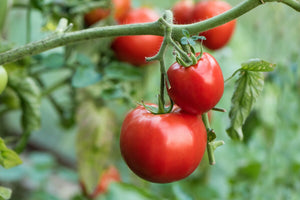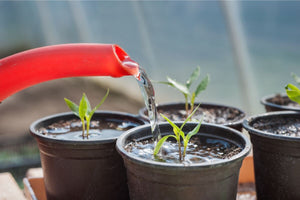Growing a Garden with Chickens in Mind: 3 Helpful Tips
Balancing a flourishing garden with a flock of chickens may seem like a challenge, but it’s a rewarding endeavor when done right. Learn how to safeguard your plants with barriers and designated chicken-free zones and grow nutrient-rich fodder specifically for your birds. By implementing these tips, you’ll create a productive and peaceful space where your garden and chickens coexist happily.

Gardening and raising chickens are not just modern hobbies. These were necessary skills in most families for generations. However, anyone who’s tried to balance these two pursuits knows the challenges chickens can pose to a garden. Their natural behaviors—scratching, pecking, and digging—can quickly turn your vegetable beds into a chaotic mess.
Tips to Help Your Chickens and Garden Coexist
The good news is it’s entirely possible to maintain a thriving garden while keeping your chickens happy and out of trouble. With the right strategies, you can protect your plants, grow fodder specifically for your flock, and even use your chickens to benefit your garden in creative ways.

Set Clear Boundaries
As cute as it may look in photos, you don’t always want chickens clucking around through all areas of your garden. Keep the chicken foraging area separate from the kitchen garden.
Use fencing to keep chickens out of areas you don’t want them scratching. Netting over newly planted areas will prevent them from plucking out seedlings.
Raised beds can help keep chickens out, but you may also need to use netting.
Chickenwire makes an effective barrier. It can also be placed on the surface of the soil to keep chickens from scratching.
Focus on the Off-Season
Timing is part of the balance of gardening and raising chickens. When seeds are newly planted, this is not the time to give your chickens free range.
Once you’ve harvested your crops, your chickens can come in and clean up pests, weeds, and leftover crops. Let them get in your kale when it goes to seed in summer or wander through the squash plants in fall.
Plant with Chicken Feed in Mind
Plant areas where chickens can forage. Keep a garden that’s specifically for your chickens. And keep your food garden separate and away from chickens.
Be aware of plants that aren’t okay for chickens, such as tomatoes and rhubarb, and don’t mix them with other crops.

How Your Garden Can Feed Your Chickens
There are two main ways to grow food for chickens: Fodder or foraging crops that support free-range chickens, and garden crops that you can harvest and use to supplement their diet whether or not they are free-range.
Growing Chicken Fodder for Foraging
We’ve written about foraging and how important it is to correctly identify something before eating it. Foraging isn’t just for hikers and mushroom enthusiasts. Chickens are natural foragers. They peck and scratch at the ground to eat nutritious greens and insects.
Technically, chicken fodder is grains that have grown into grass. A mix of wheat, oats, barley, and rye is usually sprouted and grown several inches high and then fed to chickens. In addition to this healthy feed, you can also grow a forage garden. Growing a foraging garden gives your chickens a safe place to forage. When done right, chickens will be able to scratch around to find insects and eat leaves and plants.
The best way to grow chicken forage is to plant a mix of several crops in the same area. This gives chickens a variety of nutrients and prevents them from overdoing it on one plant. Also, some plants will be quickly demolished, while others can withstand the scratching—up to a point.
Ideally, you will plant these chicken fodder or foraging crops and allow them time to mature enough so they aren’t immediately destroyed.
Chickens can quickly pull up plants, so plan on moving them around. As they scratch and eat up one area, you can move them to another.
When growing food for chickens, you should treat the plants the same way you would for human consumption and avoid applying chemical fertilizers or pesticides.
What is the best forage for chickens?
The best forage crops for chickens are ones that are easy to grow for your area and offer nutritional benefits.
These are some of the seeds we offer that can make a healthy foraging pasture for your free-range chickens (or sometimes free).
You can choose to mix and match these seeds to give your chickens a variety and benefit the soil. One popular mixture is to plant alfalfa and clover together.
The heirloom seeds we offer at Sow Right Seeds are popular varieties for home gardeners. So, while we don’t specifically sell seeds for chickens, there are plants you can grow that are a natural option for foraging chickens.

What Plants to Grow to Feed Your Chickens
In addition to plants you can let your free-range chickens scratch around in, there are plants you can grow to feed your chickens. Vegetables, flowers, and herbs are all options you can feed them. If you’re already growing these, you can plant a few extra to enjoy sharing with your chickens.
Vegetables to Feed Chickens
You already know how healthy homegrown vegetables are. Chickens can also benefit from the natural vitamins and minerals found in vegetables. When given whole or chopped up, these raw vegetables will keep your flock busy pecking away.
Carrots - Carrots are a favorite vegetable for humans and chickens.
Pumpkins - Cut up or whole, a pumpkin will keep chickens busy for days.
Beets - Chickens can eat both the green tops and the beetroots.
Zucchini - Now you have another option for sharing this prolific summer vegetable.
Melons - Your chickens may enjoy a fresh slice of watermelon on a hot summer day as much as you do.
Squash - Winter squash can be stored and shared through the winter months.
Turnips - Turnips are part of the cabbage family, and chickens enjoy their cabbage flavor.
Parsnips—Parsnips are in the same vegetable family as carrots. Sweeter than turnips, they are edible treats for chickens.
Corn—Of course, corn is a favorite vegetable for chickens. However, we could classify it as a grain.

Flowers for Chickens
You might not have thought to give your chickens flowers, but the same ones that are edible for us are also edible for chickens. Never give chickens flowers from the store. Commercially grown flowers have usually been treated with chemicals that are not safe to eat. But these homegrown flowers are edible for chickens.
Nasturtiums - Nasturtiums have a peppery taste, but chickens don’t seem to mind.
Calendula - Calendula is a beautiful flower used in many herbal remedies.
Marigolds - Our Crackerjack marigolds are one of the easiest flowers to grow and will give eggs bright yellow yolks.
Echinacea - Echinacea is known to boost our immune system, and it can help chickens as well.
Sunflowers—Once your beautiful sunflowers have gone to seed, cut off the heads and feed them to your chickens. You can also dry the sunflower seeds for longer-term storage.

Herbs for Chickens
Many herbs are not only tasty but have health benefits for chickens. Herbs can help improve immune systems, add vitamins, increase egg production, and even calm hens.
Parsley - Chickens like the taste of fresh parsley, and it’s full of vitamins.
Cilantro - Green cilantro leaves can benefit a chicken’s digestive tract.
Oregano - Oregano has antibacterial properties and helps improve immune function.
Lavender - Lavender is considered a stress reliever, and it smells nice while repelling other pests.
Comfrey - Comfrey is high in protein and offers vitamins, minerals, and other health benefits.
If you grow herbs in an area where chickens are allowed to roam, let them mature before introducing chickens. You can also grow herbs for chickens in a dedicated space and then feed them cuttings. Our Planter’s Library gives specific growing instructions for each herb.

Tips for Feeding Chickens from Your Garden
When you feed chickens crops from your garden, start with small amounts. This can be a big change if they haven’t been eating a fresh diet, but they will adjust to small quantities as they get used to new flavors.
In addition to feeding your chickens crops, you can also feed them bugs. They love to eat slugs and caterpillars. When picking insects off your plants, throw them to the chickens. Or, let the chickens in. Keep a watchful eye and limit their time so that you can see if they are eating bugs or plants.
Chicken Fodder and Forage FAQs
Having chickens is sometimes like having a toddler or a new puppy. Suddenly, you are questioning everything they put in their mouths.
Can chickens roam the garden?
Whether or not you let your chickens have free range is up to you. Just know they will dig up seeds, pull up young seedlings, and possibly eat crops. At the same time, they will eat insects.
Can chickens eat tomatoes?
No, tomato plants are not good for chickens. Plants in the Solanaceae family, including potatoes, tomatoes, eggplants, and peppers, contain solanine, which can be toxic if eaten in large quantities.
Can chickens eat pumpkin seeds?
Chickens love pumpkins and pumpkin seeds. They are healthy and safe for them to eat.
Can chickens eat green beans?
Fresh green beans are okay for chickens to eat. However, chickens can’t eat raw dry beans. The same ingredient that makes humans sick will kill chickens.
Can chickens eat beetroots?
Chickens can eat beetroots and beet greens. (And no, it won’t change the color of the eggshells.)

Chickens provide fresh eggs, natural pest control, and nutrient-rich compost for your garden, while a well-tended garden can supply healthy treats and even fodder crops for your flock.
Chickens are beautiful animals, but like other animals in the garden, it’s not always picturesque. No matter how much you love your flock of chickens, if you are growing a garden to feed your family, you’ll want to protect it from chickens. Your chickens will appreciate a space just for them and the treats of fresh vegetables, herbs, and flowers.
Knowing what plants and how to grow them for chickens can help create a peaceful coexistence.
Your garden can be a healthy source of chicken food. With thoughtful management tips, you can have a beautiful, productive garden and healthy chickens.






Leave a comment